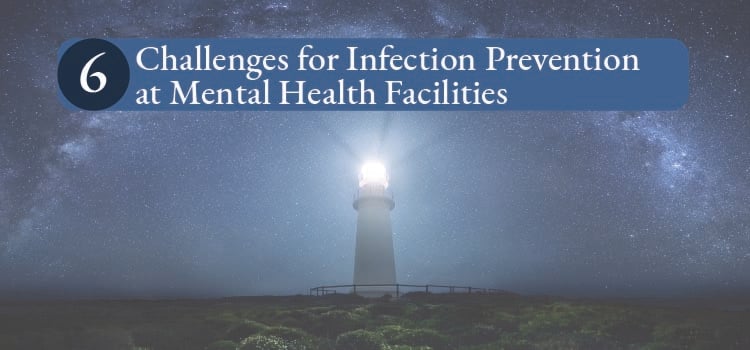6 Challenges for Infection Prevention at Mental Health Facilities

Mental health facilities, including behavioral health and addiction treatment centers, present unique challenges to infection control. While most residents may not require the invasive surgery or indwelling devices most associated with hospital-acquired infections, these patients remain vulnerable to these preventable conditions. In today's post, we'll explore 6 challenges faced by infection control professionals in a mental health setting.
The great majority of mental health facilities are outpatient/day programs, and as such, have less immediate concern with infection control. This post will focus on the facilities that provide short- or long-term overnight care, referred to as residential treatment programs. These programs are housed in units within a general hospital or in their own facility. Stand-alone facilities include psychiatric hospitals, for patients with chronic disorders, residential mental health treatment centers for adults and for children, and residential addiction/rehabilitation centers. Not included in these programs are the thousands of group and community homes around the country, but these locations also face these same challenges to infection control.
#1 Individuals with mental illness are at higher risk for infection in general, regardless of inpatient status. Transmission of infection is a greater concern due to some disorder-related behaviors, including reduced personal hygiene, self-harm, and poor environmental hygiene.
#2 Individuals with chronic mental illness or addiction can have weakened immune systems. Depending on the patient, this can be due to age, poor nutrition, substance abuse, or other underlying medical conditions such as diabetes.
#3 Untreated or under-treated medical conditions, including mental illness, are associated with higher risks for infection. If the patient has an underlying medical condition that has been inconsistently treated, for example, they are more susceptible to an infection. If their mental illness is not adequately treated, their risk also increases as related behaviors can make them vulnerable to environmental pathogens.
#4 Close physical contact increases the risk of disease transmission, including close quarters in facilities and close contact with healthcare providers. Patients with mental health illness can have behaviors that place them in close contact with fellow residents as well as healthcare providers. Shared spaces in residential facilities are also reservoirs for environmental pathogens.
#5 Poor hygiene, especially with open wounds or indwelling devices, are highly associated with infection. Some mental health patients struggle with incontinence or poor personal hygiene, increasing the bioburden in their environment particularly dangerous. Patients in this environment with open cuts or indwelling devices are exposed to dangerous pathogens as a result.
#6 Patients at residential mental health facilities may have impaired judgement, poor impulse control, limited self-care, and unpredictable compliance with medicine and treatment plans. These represent high-risk behaviors for infection, meaning that healthcare workers, other patients, and visitors must be extra vigilant about their own hand hygiene and use of personal protective equipment (PPE).
These challenges do not adequately address the challenges faced by infection prevention in a mental health facility. Other critical challenges that have more to do with funding and operations are staff shortages, lack of a dedicated infection prevention professional for each facility, adequate supplies of PPE and other disinfectants, and many others that can't be covered in just one post. Many of these issues could be lessened with a cleaner patient environment with less opportunity for infection and transmission. Biocidal materials that can continuously kill pathogens would go a long way in reducing the bioburden in the environment, an innovation that would protect patients and healthcare workers alike. What are your suggestions for these challenges? Share your thoughts in our comment section below!
![EOScu Logo - Dark - Outlined [07182023]-01](https://blog.eoscu.com/hubfs/Eoscu_June2024/Images/EOScu%20Logo%20-%20Dark%20-%20Outlined%20%5B07182023%5D-01.svg)

![[infographic] Elderly Patients and HAIs Download and share!](https://no-cache.hubspot.com/cta/default/216314/interactive-178936108064.png)



